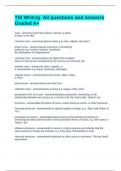TSI Writing All questions and answers
Graded A+
noun - answersa word that names a person, a place,
a thing, or an idea.
common noun - answersa general name e.g. man, religion, document
proper noun - answersnames someone or something
particular e.g. Andrew Jackson, Buddhism,
the Declaration of Independence
concrete noun - answersnames an object that occupies
space or that can be recognized by the senses e.g. wall juice sun
abstract noun - answersan idea, a quality, or
a characteristic e.g. liberty, freshness, dedication
singular nouns - answersname one person, place, thing,
or idea.
plural nouns - answersname more than one.
collective noun - answersnames a group e.g. league, tribe, class
possessive form of a noun - answersindicates possession, ownership, or the
relationship between two nouns e.g. a mouse's tail, the mice's tails, James's car
pronouns - answerstake the place of nouns, words acting as nouns, or other pronouns.
Personal pronouns - answersrefer to specific people or things, e.g. *She* sold *them* to
*us*.
possessive pronouns - answerspersonal pronouns that indicate possession or
ownership and they take the place of the possessive forms of nouns, e.g. *My* worry is
*yours*, too.
reflexive pronouns - answersrefer to nouns or other pronouns and indicate that the
same persons or things are involved, e.g. They gave *themselves* a treat.
intensive pronouns - answersadd emphasis to other nouns or pronouns. The leg *itself*
was broken.
,indefinite pronouns - answersrefer to persons, places, or things in a more general way
than nouns do, e.g. *E*ach of the major harbors along the Atlantic seaboard has a
unique character.
demonstrative pronouns - answers(this, that, these, and those) point out specific
persons, places, things, or ideas.
interrogative pronouns - answers(who, whom, whose,
which, and what) form questions.
relative pronouns - answersbegin subject-verb groups
called subordinate clauses. Relative pronouns include who, whom, whose, which, that,
what, whoever, whomever, whichever, and whatever.
verb - answersa word that expresses action or a state of being.
action verb - answerstells what someone or something does, e.g. The dog *caught* the
ball in its teeth.
How she *yearned* to own such an animal.
transitive verb - answersis an action verb that is followed by a word or words (known as
the direct object) that answer the questions what? or whom? E.g. The cat *trailed* us
home. (Us is the direct
object.)
intransitive verb - answersis an action verb that is not followed by a word that answers
the questions what? or whom? The cat *trailed* behind us. (Behind us tells where.)
linking verb - answerslinks, or joins, the subject of
a sentence (often a noun or pronoun) with a word or expression that identifies or
describes the subject.
The most common linking verb is *be* in all its forms, including *am*,* is*, *are*, *was*,
*were*, *will be*, *has been*, and *was being*.
Other verbs that can function as linking verbs are *look*, *grow*, *feel*, *remain*,
*appear*, *seem*, *sound*, *become*, *taste*, *stay*, and *smell*. Mnemonic (acrostic):
*BF BLASTS GR(A)SS*
These verbs can also be used as action verbs. To determine whether a verb is used as
an
action or a linking verb, substitute *seem* for
the verb. If seem can be substituted, the verb is probably a linking verb.
*LINKING*: The crowd *stayed* calm.
(Seemed makes sense.)
, ACTION: The crowd *stayed* on the street.
(Seemed cannot be substituted.)
adjective - answersis a word that modifies a noun or pronoun by limiting its meaning.
*old* horse, *leisurely* stroll,
*second* class, *tragic* play,
*federal* law, *some* money,
*this* aim, *those* coats,
*few* quarrels
Possessive pronouns and nouns are considered adjectives because they modify nouns.
*our* teacher, *their* music
*Kim's* bike
Most adjectives have different forms to indicate
their degree of comparison.
Positive = good, comparative = better, superlative = best
Articles are the adjectives *a*, *an*, and *the*. *A* and *an* are called indefinite articles.
*The* is called a definite article.
proper adjectives - answersformed from proper nouns and begin with capital letters.
*African* continent, *Canadian* border, *Finnish* winters, *Japanese* cars
adverb - answersis a word that modifies a verb, an adjective, or another adverb by
making its meaning more specific.
Saul *carefully* arranged the flowers.
(modifies verb arranged)
Midori was *very* careful. (modifies adjective
careful)
Pavlik left *quite* hastily. (modifies adverb
hastily)
Adverbs tell when, where, how, and to what degree or to what extent.
They see her *often*. (when) Rob is asleep *downstairs*. (where)
Rita drove *carefully*. (how)
Anu *hardly* visits anymore. (to what degree)
negative adverbs - answersinclude the word not, the contraction -n't, or other negative
words.
The lawn is *scarcely* green.




